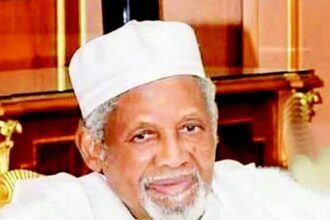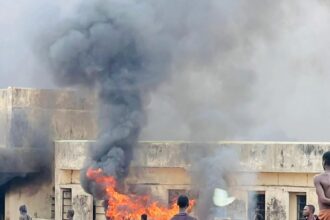...To get all news updates, Join our WhatsApp Group (Click Here)
Also Join our WhatsApp Channel (Click Here)
The appointment of Kachikwu may not have come to many as a surprise, considering that President Buhari had promised to beam his search light on the NNPC which has a reputation for high level of corruption.
Dr. Emmanuel Ibe Kachikwu, the newly appointed Group Managing Director of the Nigerian National Petroleum Corporation (NNPC), yesterday assumed duty as the Group Managing Director at a brief handover ceremony held at the NNPC Towers, Abuja. Until his appointment, Kachikwu was the Executive Vice Chairman and General Counsel of Exxon Mobil (Africa).
The new helmsman expressed gratitude to his predecessor, Dr. Joseph T. Dawha, for his hard work in holding the NNPC, while pledging to work assiduously in achieving the president’s growth aspiration for the oil and gas industry.
The appointment of Kachikwu may not have come to many as a surprise, considering that President Muhammadu Buhari had promised to beam his search light on the NNPC, which has a reputation for high level of corruption. President Buhari, prior to his inauguration as the President, had promised to carry out an overhaul of the corporation’s activities, while bringing all culprits to book.
Kachikwu, is taking over the affairs of the troubled NNPC at a time the global oil industry is grappling with low crude oil prices.
How Kachikwu emerged
Daily Sun learnt that three people were pencilled down for the job of NNPC GMD. They are Isa Inua, Deputy Managing Director of the Nigerian Liquefied Natural gas (LNG); Musa Kida of Total Worldwide and Kachikwu.
Sources revealed that although President Buhari found the three nominees qualified and capable of handling the affairs of the NNPC, he apparently picked Kachikwu as the southerner among the three.
Kachikwu is one of the few southerners the Buhari administration has appointed to executive position since May 29. In the last two months, most of the appointments have favoured the North.
Why Joseph Dawha-led management was sacked
The high level of corruption in the NNPC may have led to the sack of the management, especially as it relates to the crude oil swap deal, involving thousands of barels of crude oil that remained unaccounted for.
An independent investigative analysis submitted to President Muhammadu Buhari, revealed that over $32 billion oil revenue was lost to NNPC’s mismanagement of Domestic Crude Allocation (DCA), opaque revenue retention practices and corruption-ridden oil-for-product swap agreements.
Also, the sack of Dawha and hiring of Kachikwu is in line with Buhari’s plan to bring a breath of fresh air into the NNPC. The president, it was gathered, does not want anybody who was part of the system for fear that the person may have been corrupted.
Moreso, in keeping with his promise of sanitising the sector, the coming on board of Kachikwu, may have been informed by his private sector background, as Buhari wants NNP to run as a business entity, with every sense of responsibility. His ascension to the mantle of leadership of NNPC is expected to turn the fortunes of the troubled NNPC around.
Task before new NNPC GMD
Kachikwu will be confronted with a plethora of problems, the deadliest of which is the oil industry cabal that would ensure that all his reforms are frustrated. Others are pipeline vandals, the ailing refineries, fuel subsidy and funding of JV operations, among others
Pipeline Vandalism
Pipeline vandalism had reached an alarming magnitude, since the late 1990’s as the NNPC witnessed between 450 and 1,000 cases of vandalism annually. The high rate of vandalism had obstructed the supply and distribution of petroleum products (both crude and refined) during the period in review.
NNPC had consistently said that within the last 10 years,it had spent over N174.57 billion on pipelines repairs from a total of 16,083 pipeline breaks. While majority of about 15,685 representing 97.5 per cent of the total was from acts of vandalism, the balance of about 398 cases or 2.4 per cent was due to ruptures.
NNPC records showed that System 2E/2EX, which conveys products from the Port Harcourt Refinery to Aba-Enugu-Makurdi depots onwards to Yola-Enugu-Auchi, appears to be the haven of pipeline vandalism in the country, particularly the Port Harcourt-Aba/Isiala-Ngwa axis. In all, about 8,105 line breaks were recorded along the system 2E within the period representing about 50.3 per cent of the total. The attacks left the NNPC with a cost of N78.15 billion in product losses and pipeline repairs. On gas, statistics also showed that the incessant attacks on the Trans Forcados Pipeline have put it out of service since May 2009, thus making it impossible to evacuate crude oil/condensate from some Shell-operated facilities. Currently, over 300,000 bpd and 140mscf production have been deferred, with about N11 billion spent on the repair of about 55 points vandalised on the line. NNPC further said it spent over US$42.952million to execute a two-phase repair of 74 damaged points in System 2C-1 – the Escravos Warri Crude Oil Pipelines which started in September 2009, to enable the start-up of the Warri and Kaduna refineries.
Frequent turn around maintenance
The new boss is expected to bring his experience on board to resolve the constant TAM, which had become a pain in the neck for Nigerians, as the corporation keeps making huge budget for TAM, with nothing to show for the huge expenditure as the refineries have failed to deliver petroleum products to Nigerians.
With the announcement by NNPC that Port Harcourt and Warri refineries have successfully restarted production after a nine-month phased rehabilitation programme.
Port Harcourt Refinery has already raised its operational capacity to about 60 per cent of its 210, 000 barrels per day (bpd) capacity, while production at Warri Refinery was projected to hit 80 per cent of installed 125,000 bpd capacity soon.
The Port Harcourt Refinery was projected to boost the nation’s local refining capacity with a product yield of five (5) million litres of petrol per day, while Warri Refinery would contribute about 3.5 million litres of petrol to local refining capacity.The new NNPC boss is expected to look inwards into the activities of the refineries to ensure that the cabal frustrating the effective operations of the refineries are identified and brought to book,so that Nigerians can reap the benefits of the resources expended on it.
Fuel subsidy
Fuel subsidy is an drain pipe for the country and Nigerians have constantly harped on the need for its removal as it is believed that the regime is only profiting a few Nigerians and some corrupt officials in NNPC.
He is expected to bring down the level of the country’s expenditure on subsidy from the current N1.5 trillion more than the combined budgets for Education, Health, Agriculture, Rural Development, Works, Transport, and Lands and Housing put together.
The truth is that the subsidising petrol distorts the market and has resulted in inefficiencies and substantial loss of revenue for the government through corruption. It has contributed to the collapse of our local refineries by making them unprofitable for private investors to invest. The subsidy regime has also been responsible for sporadic fuel shortages at fuel stations as corrupt marketers, after receiving subsidies, have proceeded to sell the subsidised fuel to neighboring countries at higher prices.
Improved funding for JV operations
For several years, NNPC has failed to meet up with its cash call obligations, especially its Joint Venture operations, a situation which is hurting the economy and making it difficult for the country to reap the inherent benefits in the oil and gas sector
Indeed, Exxonmobil affiliates in Nigeria had two weeks ago lamented the inability of government to meet its cash call obligations in their Joint Venture agreements, saying the development is slowing down exploration activities.
The oil giant disclosed this at its 2015 Energy Outlook Series held in Lagos as part of efforts to educate stakeholders on what to expect from the energy market in 2015 and beyond.
Upstream Treasurer, Exxonmobil Africa, Mr.Anibor Kragha, regretted that JV production has gone down by half, adding that funding constraints in the industry remained real.
‘‘You can only drill if you have fiscal policies that work. We are not drilling much and making new discoveries to grow our reserves. We are not resource challenged but funding challenged. All this in a way slows down the pace of progress.
If we don’t have new developments in conventional, there would be significant decline because these fields have natural decline rates. So, because of that, we have to continuously drill. But as we stand now, we have a lot of JV deals with NNPC and they are seriously underfunded,’’ he said.
Downstream challenges
The corporation cannot afford to maintain the status quo of long queues at the Filling Stations since the availability of products at affordable pump prices are ways of measuring the performance of the NNPC by the public.
This, NNPC has failed to achieve, hence the need to address the factors and challenges responsible for the failure. A number of factors hampering the performance of the Corporation primarily is the fact that the Corporation has not been functioning as a commercial entity which accounts for the systemic issues like limited accountability and performance management.
Other internal factors include limited revenue source, high losses along value chain, low refinery capacity utilization and disproportionate administrative and corporate headquarters costs.Some factors that are extraneous to the Corporation as those of delays in customs clearance, high level of volatility in the international crude oil prices, security/unrest in the Niger Delta and the vandalism of pipelines.
The Man, Kachikwu
Dr. Emmanuel Ibe Kachikwu, a native of Onicha- Ugbo in Delta State,attended the University of Nigeria (UNN) Nsukka,graduating in 1978 with distinction, emerging as the best graduate.
ACADEMICS:
•Distinction and best graduate (UNN)
•BL (Law School) First Class best graduate. Won 7 of available 9 prizes in 1979.
•LLM Harvard Distinction and best graduate 1980, specialization on Energy and Petroleum Law and Investment.
•PHD/SJD Harvard Distinction and best graduate, Specialization on Petroleum and Investment Law Strategies. Set record time for completing Doctoral Thesis.
•H.Dip.T.L; Georgetown, USA
FSCG (Fellow Society for Corporate Governance)
FCIArb (Fellow Chartered Institute of Arbitration)
FCIPP (Fellow Chartered Institute for Petroleum Policy)
Visiting professorship for; various Universities in the world including Harvard Law
CAREER TRACK:
•Over 30 years in policy making positions in Petroleum Industry including;
•General Counsel/Legal Adviser Texaco Nigeria and Texaco Overseas Petroleum Co – 10 years (1984 -1994).
•General Counsel/Secretary to Board Mobil Producing Nigeria Unlimited – 2001.
•Executive Director ExxonMobil Group of Companies, (7 in all) – 2003.
•Executive Vice Chairman/General Counsel ExxonMobil Companies in Nigeria And Oversight Counsel ExxonMobil Companies in Africa – since 2009.
KEY ACCOMPLISHMENTS:
•Authored several law books including the best seller – Nigerian Foreign Investment Law and Policy.
•Authored over 20 publications.
•Influenced over $10billion in investment from ExxonMobil Group into Africa including Nigeria.
•Set major policy planks on, Government Relationship, Investment Policy and Corporate Governance for ExxonMobil in Africa.
•Member of many highly influential Policy and Investment Teams for ExxonMobil Corporation.
•Lead Negotiator on Diverse issues for ExxonMobil in Africa including conclusion of Lease Renewal Negotiations for Mobil Producing.
•Solid contacts in Global Energy Sphere with contacts to most CEOs of large Petroleum Corporations, and Secretaries of Energy for key National Country players, developed over 25 years.
•Respected as a leader by Peers in the industry globally.
THE SUN
You can get every of our news as soon as they drop on WhatsApp ...To get all news updates, Join our WhatsApp Group (Click Here)
Also Join our WhatsApp Channel (Click Here)









